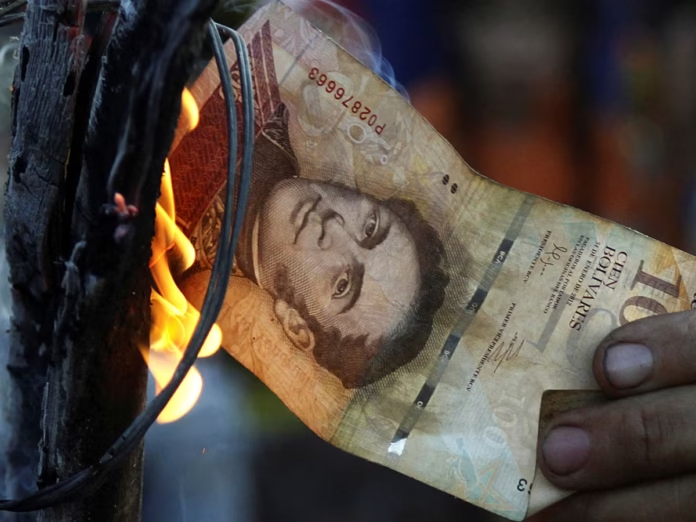Staff Reporter
Venezuelans are flocking to buy dollars, causing the local currency to crash to unprecedented lows.
This week, former President Donald Trump announced a 25% tariff on countries purchasing Venezuelan oil, implementing a strategy aimed at pressuring the government of Nicolás Maduro. The announcement has unsettled major buyers of the nation’s crude, with India’s Reliance Industries halting shipments and Spain’s Repsol rerouting a tanker.
This situation is putting immense pressure on the bolívar, as Venezuela relies on oil revenue to stabilize its currency market. With a significant shortage of dollars on the horizon, both businesses and individuals are turning to the black market for greenbacks.
On Thursday, the parallel exchange rate dropped to 106 bolívars per dollar, up from around 66 at the beginning of the year, creating the largest gap with the official rate in over five years.
“This is the strongest measure a U.S. administration has taken against the Venezuelan government from a cash flow and oil production standpoint,” stated Alejandro Grisanti, director of the consultancy firm Ecoanalítica.
The repercussions could exacerbate inflation and undermine the economic stability that the Maduro administration has achieved, partly through the widespread use of the dollar.
This crisis arrives at a particularly challenging time for Venezuela. The economy is projected to contract this year for the first time since 2020, according to a survey by the opposition-led Observatorio de Finanzas, and with the central bank’s liquid reserves dwindling, oil revenue is crucial for supplying dollars to the official market.
Chevron Corp. now has a 60-day deadline to wind down its operations in Venezuela. Anticipating the company’s exit, the Venezuelan government has already halved dollar sales to the exchange market this year, according to data from Ecoanalítica.
President Nicolás Maduro has limited options, including easing regulations on retailers, which would allow them to adjust prices away from the official rate, as noted by Jesús Palacios, an economist based in Caracas at Ecoanalítica.
“The government could adopt a more flexible regulatory framework for foreign currency operations,” he said. However, he warned that without corrective measures, the situation could deteriorate further.
Businesses are already struggling to restock their inventories as the gap between exchange rates widens, adding more pressure on inflation. Additionally, a recent decision to reduce work hours for government employees as part of an electricity-saving initiative has raised concerns about domestic consumption.
This turmoil has further diminished the government’s credibility in managing the exchange rate, according to Venezuelan economist José Manuel Puente, an associate professor at IE University in Madrid.
“It’s the perfect storm for the currency to continue weakening,” he said.

